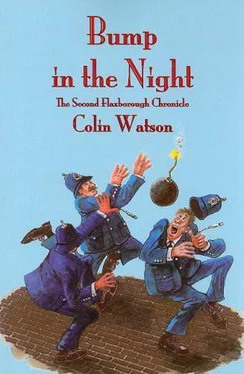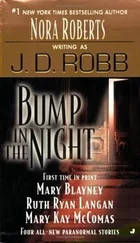Bump in the Night
Colin Watson
Chapter One
The first of the Chalmsbury blowings-up took place one warm, still night in early summer. It made the most godawful bang that had been heard in the town since a bewildered German pilot mistook the Parish Church for Lincoln Cathedral during a Baedecker raid and capped this undeserved compliment by dropping a bomb on the Food Office, a building of even less architectural merit.
Several people were awakened by the explosion, and many more by the frenzied barking of dogs that it provoked. A few disturbed sleepers got up and peered from their windows, but they saw no glow in the sky and heard no cries, no bells, no hurrying footsteps. Whatever had gone off, or up, did not seem to have left any situation worth their attention.
Only one man was sufficiently conscientious, or curious perhaps, to try and trace the source of the fearful noise that had sent him skipping out of bed, his brain flooding with confused memories of Home Guard manoeuvres, thunder storms, and an entertaining encounter his wife once had had with a boarding house geyser.
He was Councillor Oswald Pointer, wholesale wine merchant: a testy, bald-headed citizen of small stature but quite ferocious rectitude in matters affecting the security and convenience of the Chalmsbury ratepayer.
“This is Councillor Pointer speaking,” emerged the thin, nasal announcement from the telephone that Sergeant Worple picked up at the police station in Fen Street. The words were edged with accusation, and the sergeant, soured by night duty, prepared to be as unhelpful as he dared. “Oh yes, sir,” he responded stiffly.
“What was that?” demanded Pointer.
“What was...what, sir?” By the slightest of pauses in the middle of his counter-question Worple implied that he wasn’t going to believe anything that the caller might tell him.
“Why, that infernal row, of course. That great bang. What was it?”
“You heard a...bang, sir?” The measured, butleresque query, heavy with respectful doubt, swung back at Pointer like a sandbag.
The councillor snorted angrily and shuffled his rapidly chilling bare feet on the carpet. “Look here, I’m telling you a damned great explosion woke me up a couple of minutes ago. I’m asking you if you know anything about it. I’m reporting it, if you like. Now do you understand?”
“Ah, you’re making a report of an occurrence. Very well, sir. Will you hold the line a moment?” Worple put the telephone down on the desk with great deliberation, strolled to the far side of the room and returned slowly with a large book. “Your full name, now, if you please, sir.”
“Pointer. Councillor Oswald Pointer. Oh, but surely...”
“P...O...I...N...” The sergeant enunciated each letter as his pen scratched resolutely across the page. “And the address, sir?”
“Fourteen, Holmwood.”
Nearly half a minute went by. Mrs Pointer, in the next bedroom, was making quavering sounds of distress in her sleep. “Oh, shut up!” muttered her husband under his breath.
He heard Worple’s satisfied “Um” indicate that the address had been safely stowed. Then “You said something about an explosion, sir. Perhaps you can describe it?”
“Of course I can’t describe it. It was a bang. It woke me up.”
Worple remained silent a moment. “So what you mean, sir, is that you believe an explosion occurred while you were asleep but that you didn’t actually hear it.” He smiled at Pointer’s gurgle of exasperation and stretched one leg. “Is that what you wish to report, sir?”
“Look here, I didn’t ring you up in the middle of the night to quibble about forms of words. For all I know it might have been a gas main blowing up. People’s lives might be in danger.” His annoyance invested this spontaneous hypothesis with realism: God, we might all die in our beds for anything these cloddish policemen would stir themselves to do.
“That isn’t very likely, sir, if you’ll forgive my saying so,” came the patient voice from Fen Street. “You see, coal gas—the ordinary stuff you get when you turn a tap—is largely hydrogen and it only becomes explosive when it’s mixed with the oxygen in the air we breathe. And gas mains, as a general rule, are enclosed. Air doesn’t get into gas mains, sir.”
“Or, for heaven’s...”
“But if you’ve reason to believe there is a fault in your supply, you’re quite right to report it, sir, even at this time of night. Would you like me to give you the number of the Gas Board escapes department?” Worple smirked tenderly at the apple he had begun to polish upon the jersey beneath his unbuttoned tunic.
The furious Pointer said nothing more, but slammed the receiver down and stood clenching and unclenching his hands. Hearing another querulous little wail from the next room, he went softly to his wife’s door, opened it wide, and heaved it shut again as hard as he could. His scowl blossomed into a grin as he listened to the hoots of terror within.
A minute later, he affected a noisy and cross awakening when Amelia Pointer pattered to his bed and nervously touched his shoulder. “Ozzy,” she whispered, “what was that?”
“What was what?” he snarled.
She fled, squeaking apologies, out of the room.
On his way to his warehouse in the morning, Pointer overtook a neighbour, Barrington Hoole, who was sauntering slowly towards town and the optician’s shop which professional dignity did not allow him to open one minute earlier than ten o’clock.
Hoole confirmed that a detonation of some kind had shaken the district during the night and added the polite hope that it had not been Mr Pointer’s own personal bomb going off “after all these years”.
The reference was to an unconfessed but famous prank in the winter of 1942, when a quite unwarranted “Danger: Unexploded Bomb” notice had appeared overnight outside Pointer’s off-licence and ruined his Christmas trade.
Pointer ignored the reminder of this misfortune and said some harsh things about the indifference of the police to pubic-spirited inquiries. Hoole nodded agreement while he strolled alongside, happily sniffing the June air and saluting, with benign superiority, such of his fellow citizens as happened to be at their doors and dispensing those misleadingly affable salutations that are customary in small country towns.
The optician was a short, apple-cheeked man. His plumpness seemed to consist of compressed energy that he was at pains to keep from being transformed into unseemly haste or excitement. He had a femininely smooth chin, tucked well in, a beakish nose pinched at the bridge by new old-fashioned rimless glasses, an unlined expanse of intelligent forehead, and sparse but primly disciplined hair. His almost permanent smile might have been that of a man slightly mad, yet supremely fastidious in his eccentricity. Unlettered locals deeply respected Mr Hoole’s air of donnish self-confidence, but they were suspicious and resentful of what they termed his “sarky” sense of humour. On the topic of explosions, Pointer found his companion somewhat unresponsive, and the subject had been abandoned by the time they emerged from East Street into the fan-shaped area of Great Market. This green-centred triangle, containing a bus stand and a maze of cattle pens, was dominated by Chalmsbury’s war memorial (commemorative of 1914-18 only; an addendum relative to the more recent conflict was still the subject of somewhat acrimonious argument in the Town Council). It consisted of a short oval column, set upon a plinth, and bearing the bronze figure of a heavily moustached infantry officer in the act, apparently, of hurling a pair of binoculars at the Post Office.
At the further end of Great Market, Pointer entered his office, leaving Hoole to pursue a leisurely course through Church Street, now tight as a gut with vans and trucks and cars and droves of seemingly immortal cyclists, across St Luke’s Square and over the Borough Bridge to Watergate Street. Here were his consulting rooms, as he called the cupboard-like quarters squeezed between a furniture store and the melancholy mock-magnificence of the Rialto Cinema.
Читать дальше












